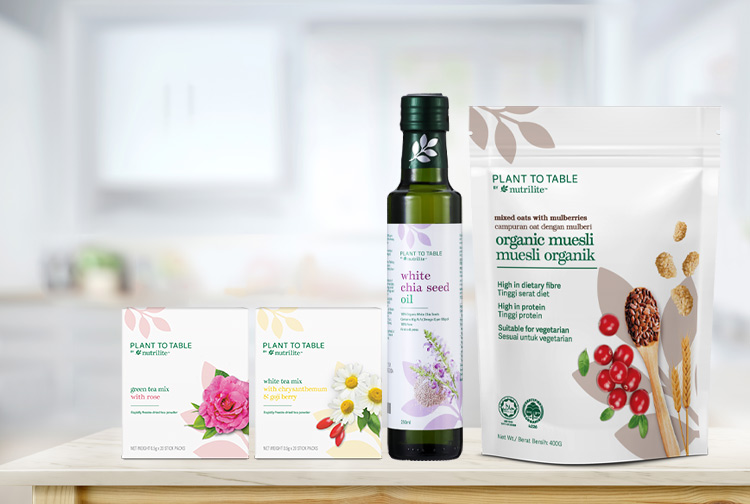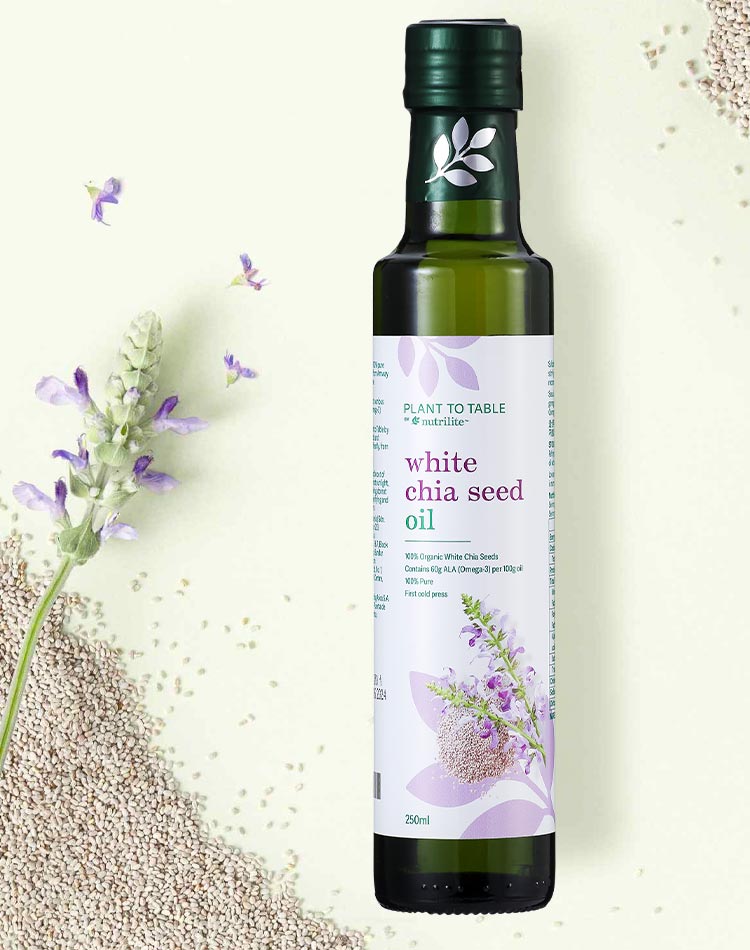
Recognising the global shift towards healthy eating, Amway Malaysia first introduced Plant To Table by Nutrilite in 2022, launching the White Tea Mix with Chrysanthemum & Goji Berry, Green Tea Mix with Rose and White Chia Seed Oil, followed by our Organic Muesli earlier this year.
Bursting with phytonutrients to nourish your body from within thanks to Nutrilite’s decades of research in botanical science and nutrition, all these products make wonderful additions to the modern kitchen. Today, however, let’s focus on the White Chia Seed Oil and why it should be a part of your healthy diet.
With 100% first cold pressed white chia seed oil, it is a quick and easy way to give yourself a phytonutrient boost without compromising on taste. Amid increasing awareness of healthy and plant-based eating, we take a closer look at this wonderful addition to your cooking repertoire.

White Chia Seed Oil and Malaysian cuisine
We all love good food. It’s a defining characteristic of Asian culture and a significant driver of our thriving tourism industry. That said, this very love for indulgent good food in Malaysia comes with a heavy price on our health – and some of the biggest culprits are cooking oils which are high in saturated fat.
When used excessively to prepare dishes, unhealthy cooking oil can lead to various health issues such as high cholesterol, high blood pressure, weight gain and heart disease. Fortunately, extensive scientific research has led to more positive development that can reduce such risks.

Benefits of White Chia Seed Oil
An awesome superfood packed with fibre, antioxidants, minerals, vitamins, protein and best of all, Omega-3, white chia seeds can help counter the negative health effects of saturated oil. Omega-3 is particularly highlighted because of its numerous benefits, including heart1,2,3, brain4, skin5 and eye6 health.
Did you know that white chia seeds have one of the highest plant-based Omega-3 content? This makes white chia seeds a fantastic source of Omega-3 for vegetarians or anyone who prefers plant-based options to supplement their diet.

Interestingly, white chia seed oil has a high smoking point so it is perfect for sauteing, roasting or baking without losing nutrients. A good source of healthy polyunsaturated fats, it tastes great as a snack dip or salad dressing with its delicious nutty flavour.
And the good news is, it’s now easier than you think to incorporate the versatile white chia seed oil into your daily meals and enjoy all its health benefits!

Why Plant To Table by Nutrilite White Chia Seed Oil?
The Plant To Table by Nutrilite White Chia Seed Oil is directly sourced from our NutriCert farms with Nutrilite’s 9-Step Traceability. Every seed is rigorously selected, planted and grown with some of the strictest farming processes in the industry. Rest assured that no synthetic fertilisers, pesticides or herbicides were used on our crops.
Not only is our farming process sustainable and healthy for both the environment and those who consume its wonderful goodness, it also guarantees the purity of our white chia seeds. In other words, it provides more health benefits from a natural source. After harvesting, our white chia seeds will then undergo cold pressing, a process that preserves their vital nutrients and rich flavour.
The organic oil in each bottle is 100% first cold pressed white chia seed oil that contains 60g alpha-linolenic acid (ALA, an Omega-3 fatty acid) per 100g. We’re talking 60% Omega-3 content with multiple health benefits for you and your family.
A healthy and natural alternative to saturated cooking oils, you can use the Plant to Table by Nutrilite White Chia Seed Oil in all your signature dishes, be they Asian, Western or fusion cuisine. If you’re someone who loves food and wants to embark on a journey to clean eating, you owe it to yourself and your loved ones to explore healthier options today!
Get the Plant To Table by Nutrilite White Chia Seed Oil at Amway.my
References: